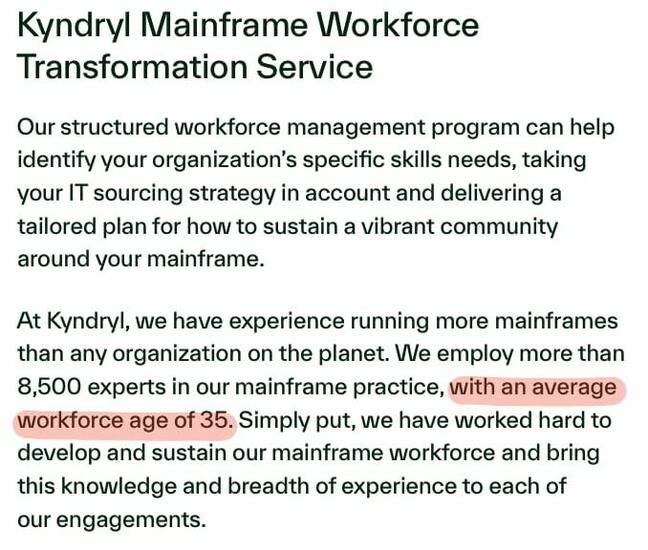Laid-off 60-year-old Kyndryl Exec Says He Was Told IT Giant Wanted 'new Blood'

An age discrimination claim filed on behalf of a former Kyndryl global software director against IBM and its spinoff has been amended to include similar allegations from a business development executive who also worked at both IT giants.
Tony DeGruccio – who served IBM for 22 years before moving to Kyndryl in September 2021, when IBM spun out its Global Technology Services (GTS) group – was let go at the age of 60. DeGruccio has joined the litigation, claiming he too was asked to leave due to his age.
Kyndryl and IBM each announced layoffs earlier this year. Kyndryl said "a small percentage" of its around 90,000 person global workforce would be let go – estimated to be around 2,000 people. In January IBM said 3,900 people would lose their jobs in this latest round of cuts, and subsequently raised that figure to more like 5,000.
IBM has been sued numerous times for age discrimination since 2018 when it was reported that company leadership carried out a plan to de-age its workforce – charges IBM has consistently denied, despite US Equal Employment Opportunity Commission (EEOC) findings to the contrary and confidential settlements.
The initial complaint alleged Kyndryl was carrying out discriminatory layoffs planned by IBM, using Big Blue's HR resources.
The amended complaint [PDF] expands on these allegations, arguing Kyndryl carried out layoffs "as a part of IBM's continued targeting of older workers for termination" and that Kyndryl carried out that strategy – ensuring that older workers left the organization by preventing them from obtaining open positions.
"After being informed that he was going to be laid off, Mr DeGruccio spoke with his manager who told him it was futile to look for other positions at the company, as Kyndryl was looking for younger employees or 'new blood,'" the revised complaint alleges.
"This advice was confirmed for him, as Mr DeGruccio witnessed older employees being summarily rejected for positions for which they were qualified, without so much as an interview, while Kyndryl actively sought to place younger employees in other open positions."
Attorney Shannon Liss-Riordan, whose law firm represents the plaintiffs, told The Register, "It appears that IBM spun off Kyndryl as a new company to try to distance these new discriminatory layoffs from IBM. We've heard from many clients that a number of older IBMers were moved to this new company as a prelude to being laid off."
Liss-Riordan said she has also been told that an algorithm was used to identify those who would lose their jobs, but had no further details to provide with regard to that allegation.
The Register asked Kyndryl whether it did use software to decide who should be let go and, if so, to elaborate on the operative selection criteria. We've not heard back.
In a prior statement, the company dismissed the lawsuit as the work of "serial lawsuit filers" – which accurately describes all lawyers – and challenged the accuracy of the claims without providing age data to support its position.
"As we have previously publicly disclosed, we are eliminating some roles globally – a small percentage – to become more efficient and competitive," the spokesperson said. "Kyndryl will defend itself vigorously."
We also asked IBM whether it has been providing support for Kyndryl's job cuts, and we've received no reply.
- IBMer on medical leave since 2008 sues over lack of pay rise – and loses
- IBM, Kyndryl cut jobs even after cutting ties
- Workday sued over its AI job screening tool, candidate claims discrimination
- Tech job bloodbath comes to IBM, CFO links layoffs to Kyndryl, Watson Health
According to the EEOC, discrimination claims of all different types increased significantly last year. "In FY 2022, the agency received 73,485 new discrimination charges, which represents an increase of almost 20 percent when compared to the previous fiscal year," the agency reported in March.
Last week, we reported that the average age among 156 laid off US Kyndryl workers was 55 years old, based on data Kyndryl provided to some employees in an apparent effort to meet the disclosure requirement of the Older Workers Benefit Protection Act. But the company failed to provide the ages of those retained – a requirement so that those laid off can compare the ages of those let go and those retained to assess the plausibility of an age discrimination claim.
Following our report, The Register was contacted by a laid off employee of Kyndryl Canada who asked not to be identified. This person, whom we'll refer to as X, provided us with data on the ages of two dozen colleagues who lost their jobs in this round of layoffs.
The average age among this group, it's claimed, is 52 – and the individual ages range from 41 to 65. At least ten of these individuals are said to have had 15 years or more experience – initially at IBM and later at Kyndryl, which only became a separate entity in 2021.
We asked Kyndryl to provide the average age of its workforce in the US, in Canada, and as a whole. But we've received no response. It's unclear why a business with internal data about the age of its employees would choose not to publish that information, when doing so might help prevent or resolve allegations of age discrimination.
Curiously, Kyndryl recently edited its marketing material [PDF] to erase its assertion that its 8,500-person mainframe group has "an average workforce age of 35." That phrase, present as of May 24, 2023, no longer appears in the Kyndryl Mainframe Workforce Transformation Service document.
Our source in Canada expressed doubt about that figure, and said if you were to look for people in the mainframe group on LinkedIn, you'd be hard pressed to find anyone under 50. They also agreed with the lawsuit's proposition that Kyndryl was just continuing IBM's layoff strategy.
"They say it's a new company but it's just continuing the worst part of IBM," said X. "That's my opinion. That's because Kyndryl was GTS and it was more of a cost center for IBM, so that's why they spun it off."
X said Kyndryl's problems were exacerbated by an IBM price change at the beginning of the year.
"We had all the IBM licensing for our clients," X told us. "Then IBM decided to increase the cloud costs, the licensing pricing, overnight. And it was because these licenses and these products were sold and maintained by Kyndryl, so we had to go and break the news to the client. And it was quite a very big mess actually."
But the pricing change, X said, was not really what led to the layoffs. Rather, our source explained, Kyndryl tried to become a sales organization and then reversed course when it didn't work.
Kyndryl's bread and butter was the large enterprise. And they were trying to get to this new market. And this didn't work
"Kyndryl was not a sales organization," said X. "It was a service organization. So they hired businesspeople. They hired all types of salespeople to sell to small and medium enterprises. But Kyndryl's bread and butter was the large enterprise. And they were trying to get to this new market. And this didn't work."
So, according to X, Kyndryl retrenched, to focus on managing large enterprise accounts inherited from when GTS was under IBM.
We're told that many of the salespeople brought on board for this gambit were hired at above market rates – some of the junior hires, X said, started at CA$120,000 ($90,000, £70,000), which was unusual for the market. And many of these people, as well as people who had been with IBM and then Kyndryl for many years, were among those let go, X said.
"It's very difficult to prove that age is a factor," said X. "Especially in large layoffs. Companies can say they're redesigning their business or whatever is needed, to get rid of the number of people."
X however described a situation similar to the lawsuit's claim that laid off employees were denied the chance to pursue internally posted jobs in other parts of the organization.
""I wasn't even offered an option to do something else [at Kyndryl]," said X. "Currently there are some open positions, so I applied under another name – I changed my resume and I applied with another name, and so I got noticed by a recruiter. And I'm having an interview with him."
Meet the new blood, same as the old blood – but probably paid less. ®
From Chip War To Cloud War: The Next Frontier In Global Tech Competition
The global chip war, characterized by intense competition among nations and corporations for supremacy in semiconductor ... Read more
The High Stakes Of Tech Regulation: Security Risks And Market Dynamics
The influence of tech giants in the global economy continues to grow, raising crucial questions about how to balance sec... Read more
The Tyranny Of Instagram Interiors: Why It's Time To Break Free From Algorithm-Driven Aesthetics
Instagram has become a dominant force in shaping interior design trends, offering a seemingly endless stream of inspirat... Read more
The Data Crunch In AI: Strategies For Sustainability
Exploring solutions to the imminent exhaustion of internet data for AI training.As the artificial intelligence (AI) indu... Read more
Google Abandons Four-Year Effort To Remove Cookies From Chrome Browser
After four years of dedicated effort, Google has decided to abandon its plan to remove third-party cookies from its Chro... Read more
LinkedIn Embraces AI And Gamification To Drive User Engagement And Revenue
In an effort to tackle slowing revenue growth and enhance user engagement, LinkedIn is turning to artificial intelligenc... Read more



